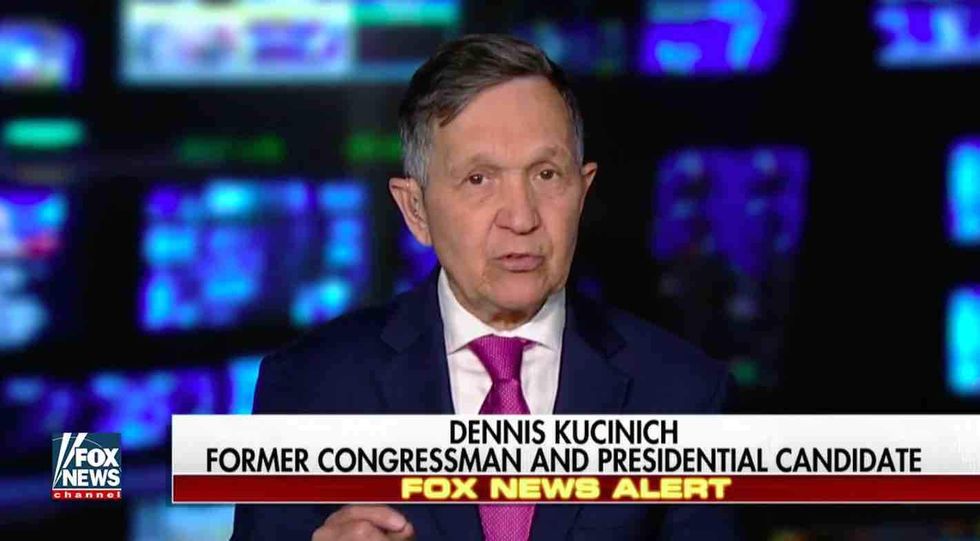
Former Ohio Democratic Congressman Dennis Kucinich says "politicized" federal agencies are trying to "take down a president." (Image source: Fox News screenshot)

Former Ohio Democratic Rep. Dennis Kucinich came to President Donald Trump's defense Wednesday and said that "politicized" federal agencies are trying to "take down" the president by illegally leaking sensitive and classified information.
Kucinich, a staunch liberal who served in Congress from 1996-2013, told Fox News' Sean Hannity that the issue poses a "clear and present danger" to America.
Kucinich's statement came on the heels of Trump-appointed Deputy Attorney General Rod Rosenstein's decision to appoint a special counsel to investigate Russia's meddling in the 2016 presidential election and the Trump campaign's alleged collusion with the Kremlin.
Trump blasted Rosenstein's decision in an early Thursday morning tweet storm. He called the investigation the "single greatest witch hunt of a politician in American history."
Many Trump supporters believe the media, along with the so-called "deep state" — or influential, longtime, deeply embedded federal bureaucrats — are trying to oust Trump by any means necessary, even if that means illegally leaking classified information.
Kucinich, who was very critical of former Democratic presidential nominee Hillary Clinton during the 2016 election, especially on foreign policy, seemed to agree.
"You have a politicization of the agencies that is resulting in leaks from anonymous, unknown people and the intention is to take down a president," Kucinich said Wednesday night on "Hannity."
"This is very dangerous to America. It's a threat to our republic. It constitutes a clear and present danger to our way of life," he said.
Kucinich encouraged Americans to ask what the leakers' motives may be in putting out information that could potentially harm the country. He then urged whoever is responsible to "come forward and make a charge and put their name and a reputation behind it instead of attacking through the media and not substantiating their position.
"Our first allegiance is to our country. This isn't about one president. This is about the political process of the United States of America being under attack by intelligence agencies and individuals in those agencies," Kucinich continued.
"Yes, as you said, there might be some good people in there, but there are certain individuals, or the 'lifers,' who want to be able to direct the policy of the country, and if the president stands in their way, whether it's a Democrat or Republican, they'll just try to run that person out," Kucinich said.
Hannity asked Kucinich if he was saying the the U.S. is "under attack by the deep state."
Kucinich responded that he does "believe that" and said, "This is a problem in our country. We've got to protect our nation here. People have to be aware of what's going on. We've got to stand up for America now. This isn't about Democrat, Republican. This is about getting what's going on in the moment and understanding that our country itself is under attack from within."
Trump was a vocal fan of government leaks throughout the presidential campaign, even publicly declaring his "love" for WikiLeaks.
As president, however, Trump has sung a very different tune when it comes to leaked information.
Just over one month into his presidency, Trump took to Twitter to urge the FBI to "find the leakers" within its own ranks.
Trump's February tweet storm came after CNN reported that the White House tried to get the FBI to squash any media reports about Trump campaign officials' communications with the Russian government during the 2016 election.
White House press secretary Sean Spicer pushed back on the report. Spicer said the White House only asked the FBI to step on those reports after the bureau notified administration officials that the story wasn't true.
“We didn't try to knock the story down. We asked them to tell the truth," Spicer said in February, the Washington Post reported.
Then, as recently as Tuesday, Trump again tweeted that "from the beginning of my administration," he had asked now-former FBI Director James Comey to find the leakers.
Trump fired Comey on May 9 because the former FBI head "was not doing a good job."
The White House initially cited the FBI's handling of the investigation into Hillary Clinton's emails, although Trump later admitted during an interview with NBC's Lester Holt that he was thinking of the "Russia thing" when he fired Comey.